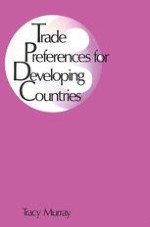1977 | OriginalPaper | Buchkapitel
The Evolving Trade Relations of the E.E.C.
verfasst von : Tracy Murray
Erschienen in: Trade Preferences for Developing Countries
Verlag: Macmillan Education UK
Enthalten in: Professional Book Archive
Aktivieren Sie unsere intelligente Suche, um passende Fachinhalte oder Patente zu finden.
Wählen Sie Textabschnitte aus um mit Künstlicher Intelligenz passenden Patente zu finden. powered by
Markieren Sie Textabschnitte, um KI-gestützt weitere passende Inhalte zu finden. powered by
At the time the G.S.P. was being negotiated international trade was ‘considered’ to be governed by the most-favoured-nation (M.F.N.) principle of GATT. However, in reality there were a number of preferential arrangements in operation, for example the European Customs Union (E.E.C), the European Free Trade Area (EFTA), the British Commonwealth Area, and the E.E.C. association agreement with eighteen African countries (Yaoundé Convention). Each of these exceptions to the M.N.F. principle provided for preferential tariff treatment on a reciprocal basis. In essence each party to an agreement discriminated against imports from third countries and in favour of imports from other members of its respective agreement. Thus the Commonwealth developing countries discriminated in favour of U.K. exports and received preferential access for their exports in U.K. markets; similarly the African states associated with the E.E.C. granted special access to E.E.C. exports and received special access to E.E.C. markets. The major tool of discrimination was preferential tariff rates.
